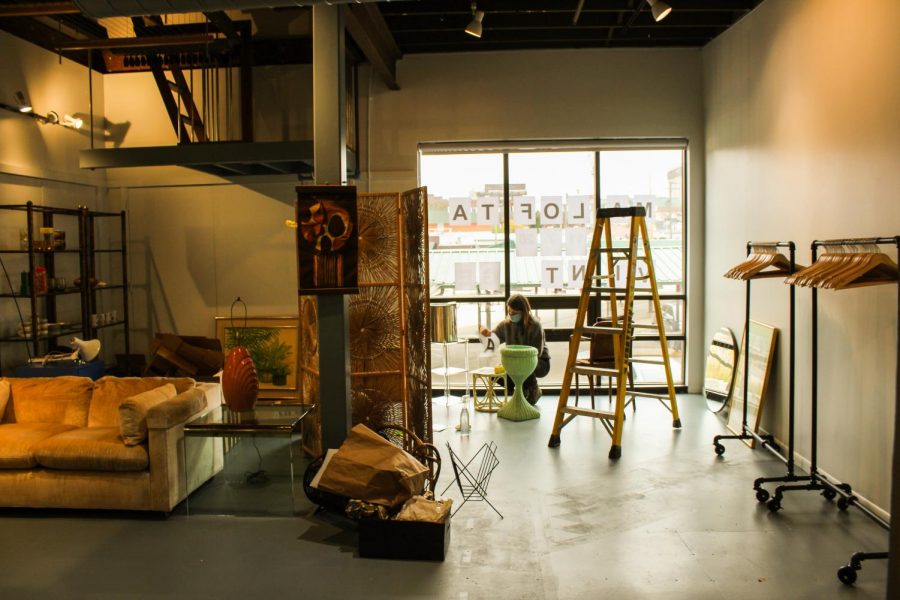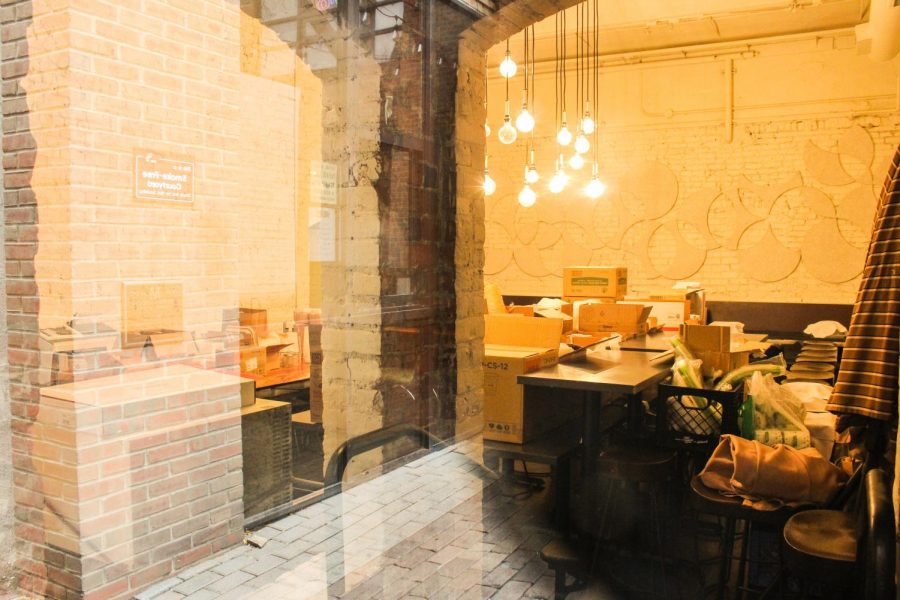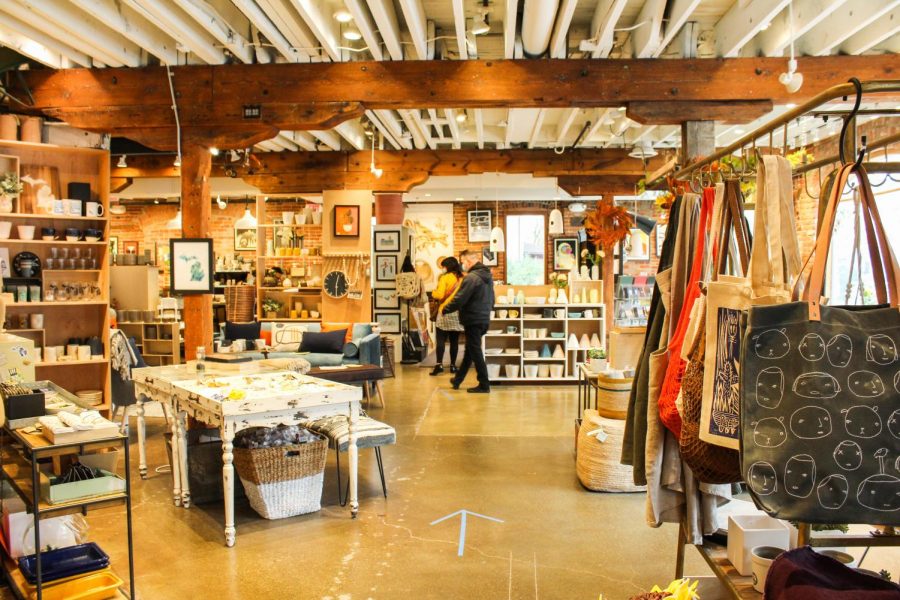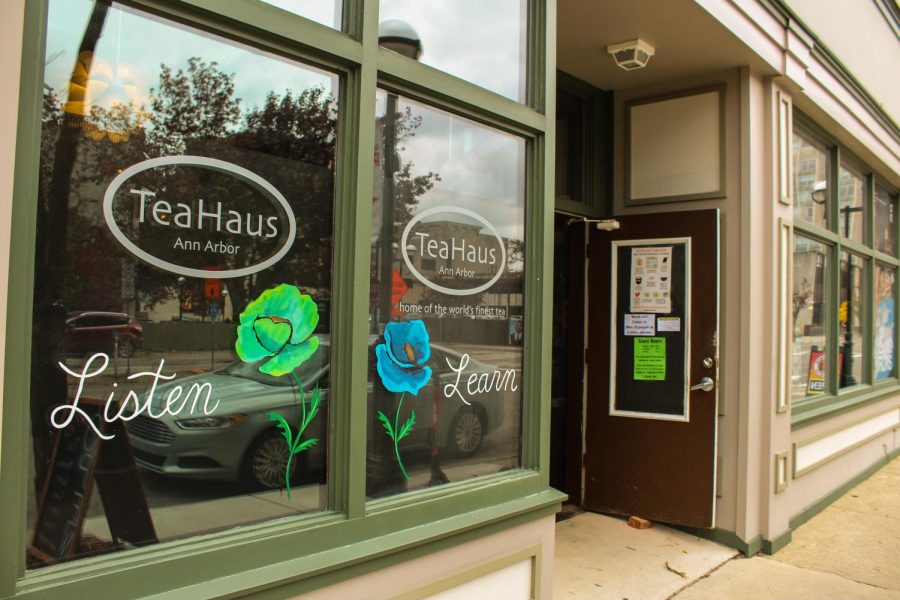Catching Up With Kerrytown
A closer look into how local Ann Arbor businesses have either benefited or been crippled by the pandemic.
Shannon Brydges tapes sheets of paper on the window showcasing the opening date of her store, Malofta Vintage. Her opening day is Nov. 7 and she intends to keep in casual.
Malofta Vintage
The COVID-19 pandemic has opened an unexpected door for Shannon Brydges, the owner of Malofta Vintage.
Brydges never intended to open up a physical space for her store. Around a month ago, when another vendor moved to a different location, she was granted the opportunity to make it her own — and she took the chance.
Brydges is just starting to assemble her vintage clothing store on the second floor of the Kerrytown Market & Shops. She plans to open on Nov. 7. She has been running her business since 2015 through Etsy.
As more people picked up an online shopping hobby during quarantine, her sales have benefited greatly.
To ensure a safe shopping experience for her and her customers, she will be wiping down high-touch surfaces frequently, enforcing social distancing, offering hand sanitizer at the register and monitoring how many people are in the shop.
Brydges is excited to embark on this new step in growing her business.
“I just hope that I have a good response from the community and that people like what I have to offer and my aesthetic,” Brydges said. “I’m just excited to build a local community around the shop because it’s all online right now. It’ll be really cool to be able to interact with people in person.”
Miss Kim
Miss Kim, a local Korean restaurant located in the heart of Kerrytown, has been up and running throughout the pandemic. The restaurant did this to keep their staff employed. But as people began following State mandates to stay socially isolated, sales faced a pretty serious decline.
“We’ve seen a significant dip in clientele,” said Terrance Gordon, the supervisor of Miss Kim. “I would say almost half of what we used to have. And I think we’re one of the lucky [businesses], that have been like that.”
Even though the business stayed open to preserve their employees’ jobs, it was inevitable that some would be let go and others would leave themselves. At peak employment, there were around 30 staff members, and now only six remain.
Gordon has been an employee at Miss Kim for the four years the restaurant has been established. The biggest challenge he has faced throughout all of this was dealing with the abrupt change in the work environment. His position as the supervisor has taken on a new role. He no longer advises employees, teaches classes or helps with hiring.
Now, most of his time is spent answering the phone and sanitizing the restaurant.
To boost the number of customers, Gordon and management are encouraging diners to use their outdoor seating and curbside pickup options.
“Every Saturday, we have a guest chef in-house to prepare food and do fun things like that,” Gordon said.
To keep the place fresh, the restaurant is rotating through cocktails and menus pretty frequently. Gordon thinks there are some positive takeaways from this whole situation.
“I’ve noticed that a lot of people are coming together through all this,” Gordon said. “We’ve donated 300 plus meals to the hospitals, and we’ve given out gift cards. People have come in and told us stories and written letters. It’s just been a really big coming-together of the community.”
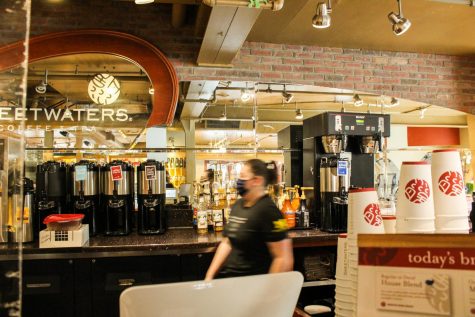
Sweetwaters
Kerrytown staple Sweetwaters Coffee & Tea never closed its doors when Governor Gretchen Whitmer issued Michigan’s stay-at-home order on March 24, 2020. The local coffee shop was an essential part of the working environment in Ann Arbor; they supplied the hospital staff with coffee as well as many frontline workers.
Their sales, however, did take a hit.
“For the first few months when everything was shut down, it slowed our business by 70 to 80%,” said Dawit Van Ee, a Sweetwaters barista. “During the morning shift, which I worked, there would be 30 to 50 customers.”
This is significantly fewer than the traffic they received years prior, as they were accustomed to welcoming around 400 customers per day.
In contrast, since they were among the few cafés in the area open during the state-wide quarantine, it brought new customers from folding competition.
When June arrived, sales began to increase, and the business achieved 70% of its normal sales. Their sales continue to increase and are approaching standard rates as the end of October nears.
“The biggest challenge for us right now is not being able to provide some of the services that we usually provide to our customers,” Van Ee said. “People can’t really sit down and enjoy the café; everything is to-go, and it feels rushed. It seems like we aren’t having that interaction with our daily customers.”
Kerrytown’s Sweetwaters is strictly enforcing safety precautions to ensure the staff and customers stay safe. Everyone is required to wear a mask when they enter the store. There are hand sanitizer dispensers located at the register and entrances and there are extra masks available for customers.
Staff must have their temperature recorded when they start a shift, wash their hands thoroughly throughout their shifts and periodically sanitize the counter area. There are signs on tables to let customers know if the table has been cleaned.
Gradually, Sweetwater’s business is returning to normal as they anticipate more customers for the winter season.
Found Gallery
For Mary Cambruzzi, owner of Found Gallery, business has been hard. Their brick-and-mortar shop in Kerrytown shut down in early March, one week before the state mandate. Cambruzzi and the staff were uncomfortable with the rise of COVID-19 cases and made the collective decision to temporarily close.
A few months later, the business has slowly reopened and is welcoming in old and new customers. Once the state allowed businesses to open, Cambruzzi took a week and deep-cleaned the store, hung up plexiglass shields and distanced the shopping aisles.
The three-month shutdown crippled the business.
“Basically, we lost a quarter of our year and had three months without any sales,” Cambruzzi said.
During the shutdown, Cambruzzi worked on developing the store’s website and listing the products she sells in-store. They have branched out to offer curbside pickup, expedited shipping to customers who purchase online and weekly email lists. In addition, Found has established a robust Instagram and Facebook following, which allows them to post what they have in stock.
Cambruzzi has gone above and beyond to offer a personalized shopping experience to customers. Those who do not feel comfortable shopping in-person can schedule FaceTime appointments for Cambruzzi to take them through the store.
The number one challenge for Cambruzzi as a business owner is to offer great customer service that is safe for customers and staff. A struggle she confronted at the start of the shutdown was financially stabilizing the company.
“[I had] to look at what loans might be available in ways that I could cut costs because we didn’t know how long [the pandemic] was going to last,” Cambruzzi said. “And I spent a lot of time researching and listening to other kinds of leaders in the retail field to what they were doing and what they were finding helpful.”
Overall she has been coping by accepting the fact that she can only control so much.
“It became very important to find ways to calm myself — both personally and professionally — in order to deal with the things that I needed to deal with on a daily basis,” Cambruzzi said. “During this time, there are so many things that are totally out of everyone’s control, whether you’re a business owner, or in your personal life. I just needed to make sure that I was taking care of myself at the same time that I was doing what I could to take care of my loved ones and my business.”
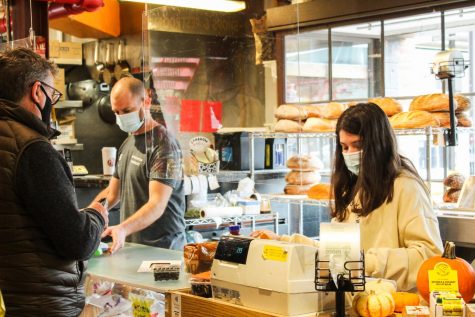
Sparrow Market
For Jordan Sparrow, owner of Sparrow Market in downtown Kerrytown, business is booming.
“On the contrary to most businesses, we’re actually doing more business,” Sparrow said. “People are more fearful of going out to restaurants and are staying home.”
Currently, Sparrow is experiencing peak numbers. The business is up 20 to 30% compared to last year. Additionally, they are employing almost double of their usual staff.
Their customer base is mostly college students and familiar faces from years past.
Initially, Sparrow had to quickly develop a method to accommodate customers not comfortable with entering the store. Management rapidly began giving out their email addresses and posting on social media, so the community knew their process: email them a list and they can bring groceries directly to customers’ cars.
Besides adapting to curbside pick-up orders and ensuring that staff and customers comply with COVID-19 safety guidelines, there have not been many major changes at Sparrow.
The business put up plexiglass shields at the register and is requiring staff to sanitize countertops and follow basic COVID-19 guidelines.
With winter ahead, Sparrow is preparing for an increase in curbside orders.
“We don’t really know what to expect for the holidays,” Sparrow said. “We expect it to be busy, but we don’t if people are going to buy traditional [foods] like turkey and ham. Maybe it will just be regular grocers as people aren’t going to be getting together as much.”
Sparrow Market is definitely hunkering down and preparing for the worst during the upcoming seasons.
“We expect things to kind of go a little crazy, again, to some degree,” Sparrow said. “So we’re preparing for more curbside orders and probably fewer people in the actual store.”
TeaHaus
TeaHaus, a local tea shop and café in Kerrytown, has definitely felt the full financial implications of COVID-19. The business is doing everything it can to stay afloat while also doing what it can to support the community.
The store shut down when Governor Whitmer issued the stay-at-home order and still has not completely reopened. The TeaHaus café remains closed, but the attached store where you can purchase products now accepts business.
Lisa McDonald, the owner of TeaHaus, has also been unable to open her other business right around the corner, Eat More Tea, due to financial and safety reasons.
“We’ve lost a large percentage of our sales,” said McDonald. “Two-thirds of my business is shut down.”
Overall, they are down in sales 30 to 35% compared to 2019.
The one thing that is helping them keep their doors open is their well-established website. Without their website, TeaHaus would be struggling even more. Compared to other businesses that had to scramble to put together sites, McDonald was confident in their online presence. The company has been shipping online orders worldwide for 12 years.
TeaHaus is starting to regain some business as more people are going out. Their peak months were July and August. However, they are hoping for the best and preparing for the worst as the winter months come around.
The biggest challenge for McDonald during these times is paying rent and affording expenses.
“My landlords were amazing,” McDonald said. “They gave [me] reduced rent for a few months, which literally made the difference between closing or not closing. Being down 35% in sales doesn’t mean that your expenses go down as well.”
In her spare time, McDonald has been using the TeaHaus kitchen to prepare and donate meals to public schools, shelters and low-income housing units. She donates up to 600 meals a week and has been doing so since Ann Arbor Public Schools ceased in-person instruction.
“My biggest concern was that a lot of kids, even in Ann Arbor — the only meal they get a day is often free school lunch,” McDonald said. “Where are they going to get food?”
Mcdonald is encouraging people to shop locally during these challenging times.
“As we’ve seen, the pandemic has benefited already the people who have been killing small businesses to begin with,” McDonald said. “And so, I think it’s not just the pandemic that’s killing small businesses right now.”




